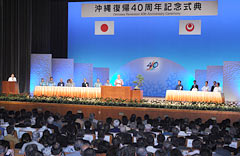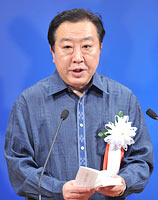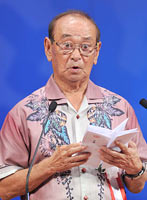Okinawa marks 40th anniversary of return to Japan Prime Minister pledges not to allow Futenma base to become a permanent fixture

On May 15, at the Okinawa Convention Center, in Ginowan, the celebration ceremony commemorating the 40th anniversary of Okinawa’s reversion to Japanese sovereignty was held. About 1200 people attended, including Prime Minister Yoshihiko Noda and distinguished guests from outside the prefecture and from Okinawa.
May 16, 2012 Ryukyu Shimpo
On May 15, the day that Okinawa marked the 40th anniversary of its reversion to Japanese sovereignty, the central government and the Okinawa Prefectural Government co-hosted a ceremony at the Okinawa Convention Center in Ginowan. Prime Minister Yoshihiko Noda expressed his determination, saying, “Futenma base will definitely not be allowed to become a permanent fixture. I pledge to reduce the burden of U.S. military bases.”
Okinawa Governor Hirokazu Nakaima said in his speech, “The Okinawan people are determined to move Futenma Air Station outside of the prefecture and to have the land now used by the U.S. military returned early.”
With regard to the deployment plan of the MV-22 Osprey vertical take-off and landing transport aircraft to Futenma in July, former Minister of the Okinawa Development Agency Kosuke Uehara strongly criticized central government policy on the Okinawa issue, saying, “This represents disdain for the Okinawan people.”
Speeches by hosts and guests at the ceremony reflected the strong dissatisfaction among the Okinawan people with 40 years of excessive burden of the base issue.
The ceremony was attended by about 1200 people from Okinawa and outside the prefecture, including the U.S. Ambassador to Japan John Roos, the speakers from both houses, the chief justice of the Supreme Court, and local representatives and representatives from a range of sectors in society.
Outside the ceremony hall, citizen groups staged a protest rally against the government’s policy on the military base issue.
At the ceremony, Prime Minister Noda stated, “Japan-U.S. security arrangements will continue to play a major role. While maintaining a deterrent capability, we will move swiftly to reduce the burden of bases on Okinawa.” Noda also suggested that his government would consider budgeting for the construction of the second runway at Naha Airport in fiscal 2013 and that the administration of Shurijo Castle Park would be transferred to the prefecture from the central government in fiscal 2018. He also indicated the possibility of research into creating a rail system.
Governor Nakaima stated, “Okinawan people strongly desire that the government radically revise the Status of Forces Agreement between Japan and the United States of America, and want Futenma Air Station to be moved outside of the prefecture and its land returned to its owners early.”
Former Minister Uehara explained the hardships of the Okinawan people and their desire to return to Japanese sovereignty. With regard to situation in Okinawa as it presents itself today – 74% of the U.S. military facilities in Japan are concentrated in the prefecture despite it only having 0.6% area of the country, “This is an abnormal situation,” he said, criticizing the central government’s policy. Uehara requested that the Prime Minister not to build any more bases for U.S. military on the land and sea in Okinawa, and he sought of moving the Futenma base, which is said to be the most dangerous airport in the world, to outside of the prefecture as soon as possible. He disagreed with the deployment of the Osprey aircraft, saying, “This indicates disdain for Okinawa – it is unacceptable.”
(English translation by T&CT, Mark Ealey)
Previous Article:AMICUS students publish a school paper about the reversion of Okinawa
Next Article:U.S. Senate panel rejects budget for transferring Marines stationed in Okinawa to Guam
[Similar Articles]
- Japanese Prime Minister and Okinawan Governor remain far apart on Futenma relocation issue
- Prime Minister does not accept Okinawa Governor’s request for withdrawal of Osprey aircraft
- Editorial: Talk of base burden reduction in PM Abe’s policy speech is a sham
- Ceremony held for 0.8% land return of Futenma base, Governor Onaga demands whole base to be moved out of Okinawa
- Okinawa Governor calls for Futenma base to stop operating within 5 years


 Webcam(Kokusai Street)
Webcam(Kokusai Street)


